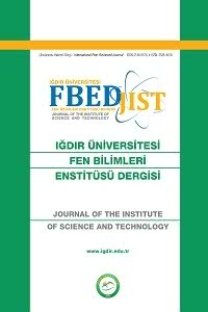Ultrasonik ve Ultrasonik Sınır Altındaki Farklı Ses Frekanslarının Culex pipiens (L.)’in (Diptera: Culicidae) Larvaları Üzerine Etkilerinin Değerlendirilmesi
Vektör eklembacaklılar olarak bilinen sivrisinekler, insanlığa çeşitli hastalıkları bulaştırırlar. Dünya çapında, sivrisineklere karşı uygulanan mücadele programları, mikroorganizmaları, kimyasalları, doğal düşmanlarını, bazı fiziksel bariyerler gibi farklı ajanlardan oluşmaktadır. Çalışmamızda, ultrasonik ses seviyenin üstündeki ve altındaki değişen ses frekanslarının Culex pipiens larvalarına olan etkilerini belirlemeye çalıştık. Toplamda sekiz saat süren deneylerimizde, 3 farklı düzeyde (10.8 kHz, 20.0 kHz ve 24.5 kHz), 3 tekrarda, ses frekansı üreten piezo transdüktörlü modifiye kaplarda bulunan 720 adet sivrisinek larvası kullanılmıştır. Kontrol grubu olarak da aynı sayıda larva kullanılmıştır. Culex pipiens’in ikinci evre larvalarının, kullanılan frekans seviyelerine daha duyarlı olduğu bulunmuştur. Ayrıca larva mortalite açısından en etkili ses frekansı, 129 ölü larvanın gözlemlendiği, 10.8 kHz olarak tespit edilmiştir. Kullanılan üç ayrı frekans için larvalar üzerinde gözlemlenen mortal etkinin, değişen düzeylerde uygulanan ses frekansları ile doğrudan ilişkili olmadığı, larvaların her birinin akustik rezonans sınırları ile ilgili olduğu tarafımızca tespit edilmiştir.
Anahtar Kelimeler:
Sivrisinek, Culex pipiens, Ses Frekansı, Ultrasonik, Akustik Rezonans
Evaluation of the Effects of Different Ultrasonic and Under Ultrasonic Limits Sound Frequencies on the Larvae of Culex pipiens (L.) (Diptera: Culicidae)
Known as vector arthropods, mosquitoes transmit several types of diseases to human. Applied vector programmes worldwide against mosquitoes have different agents such as microorganisms, chemicals, natural enemies, physical barriers, etc. We aimed to determine the effects of varying sound frequencies above and below ultrasonic level (10.8 kHz, 20.0 kHz and 24.5 kHz), on Culex pipiens larvae with three replicates. In total, 720 mosquito larvae located in modified container with produced three different level sound frequencies piezo transducers were used in our experiment lasting eight hours. Also, the same number of larvae were used as control groups. Second instar larvae were detected more sensitive to used frequencies level. Also, in terms of larval mortality, the most effective sound frequency was 10.8 kHz in which 129 larvae died. It was concluded that the mortal effect was not related to the change in the frequency of sound; and this effect was related to acoustic resonance of the larvae used in the study.
Keywords:
Mosquitoes, Culex pipiens, Sound Frequencies, Ultrasonic, Acoustic Resonance,
___
- Aflitto NC, Hofstetter RW, 2014. Use of acoustics to deter bark beetles from entering trees. Pest Manag Sci, 70(12):1808-14.
- Alten B, Caglar SS, 1998. Vektör Ekolojisi. Journal of Turkish Ministry of Health. p. 226, Ankara- Turkey
- Andrade CFS, Cabrini I, 2010. Electronic mosquito repellers induce increased biting rates in Aedes aegypti mosquitoes (Diptera: Culicidae). J Vector Ecol, 35(1):75-78.
- Ayannusi T, Gire Z, Le D, Norwood RC, 2018. Acoustic Larvacide with an Autonomous Larvasonic Boat. Annual Capstone Design Conference, Houston, Texas, USA, April 27, 2018.
- Britch SC, Nyberg H, Aldridge RL, Swan T, Linthicum KJ, 2016. Acoustic Control of Mosquito Larvae in Artificial Drinking Water Containers. J Am Mosq Control Asso, 32(4):341–344.
- Caglar SS, Alten B, Bellini R, Simsek FM, Kaynas S, 2003. Comparison of nocturnal activities of mosquitoes (Diptera: Culicidae) sampled by New Jersey light traps and CO2 traps in Belek, Turkey. Journal of Vector Ecology, 28(1):1-11.
- Cetinkaya A, 2010. The Sound Analysis of Some Insect Species and the Investigation of Availability Agricultural Struggle, Çukurova University, Science Institute, Msc Thesis.
- Isci C, 2006. Ultrasonik ve Diğer Sivrisinek Kovucular. Journal of Yasar University, 1(4):293-301.
- Khalfia NO, Ibrahim DSA, Khairy RMY, Omer RMY 2016. College of Science Department of Scientific Laboratories-Physics research group. The effect of the ultrasound waves on mosquitoes, Report No:1.
- Kuscu F, Ozturk DB, Gul S, Babayigit ML, 2014. The epidemiology of malaria in Adana between 2002 and 2012. Turkish Journal of Parasitology, 38:47-50.
- LaLiberte G, Haber E, 2014. Literature Review of the Effects of Ultrasonic Waves on Cyanobacteria, Other Aquatic Organisms, and Water Quality. Wisconsin Department of Natural Resource. Research Report.
- Nyberg MH, Nyberg HJ. U.S. Patent No. 4,284,845, 8/1981.
- Okorie PN, Okareh OT, Adeleke O, Falade CO, Ademowo OG, 2015. Effects of an in-built ultrasonic device on Anopheles gambiae s.l mosquitoes in an indoor environment. International Research Journal of Engineering Science, Technology and Innovation, 4(1): 5-11.
- Ozkurt H, Altuntas O, 2018. Quality Parameter Levels of Strawberry Fruit in Response to Different Sound Waves at 1000 Hz with Different dB Values (95, 100, 105 dB). Agronomy, 8(127):1-13.
- Wiley EO, Liebermann BS, 2011. Phylogenetic Systematics. Theory and Practice of Phylogenetic Systematics. Hoboken, New Jersey: Wiley-Blackwell.
- Wilkerson R, Linton YM, Fonseca DM, Schultz TR, Price DC, Daniel A, 2015. Making Mosquito Taxonomy Useful: A Stable Classification of Tribe Aedini that Balances Utility with Current Knowledge of Evolutionary Relationships. Plos One, 10(7):e0133602.
- Vences M, Guayasamin JM, Miralles A, de la Riva I, 2013. To name or not to name: Criteria to promote economy of change in Linnaean classification schemes. Zootaxa, 3636:201–244.
- ISSN: 2146-0574
- Yayın Aralığı: Yılda 4 Sayı
- Başlangıç: 2011
- Yayıncı: -
Sayıdaki Diğer Makaleler
Sulu ve Sulu Olmayan Elektrolitlerde Tavlanmış Yüksek Karbonlu Çeliğin Elektrokimyasal Kapasitansı
Abdulcabbar YAVUZ, Kaan KAPLAN
CuO-grafen Nanokompozitlerinde Etanol Elektrooksidasyonu
Süt Endüstrisi Atıksularının Kimyasal Arıtımının Yanıt Yüzey Yöntemi ile Optimizasyonu
Eren OZDEN, Sıtkı ERMIS, İbrahim DEMIR
A New Mathematical Model for Assembly Line Worker Assignment and Balancing
Düşük Tellür Katkılı CuInGaSe2 İnce Filmlerin Yapısal Özelliklerinin İncelenmesi
52Cr’un Nükleer Yapı Özelliklerinin Fenomonolojik İncelenmesi
Gıda Ürünlerinin Raf Ömrünün Uzatılmasına Yönelik İndirgen Atmosfer Paketleme Tekniği
Standart Yağış İndeksi İle Ceyhan Havzasında Kuraklık Analizi
